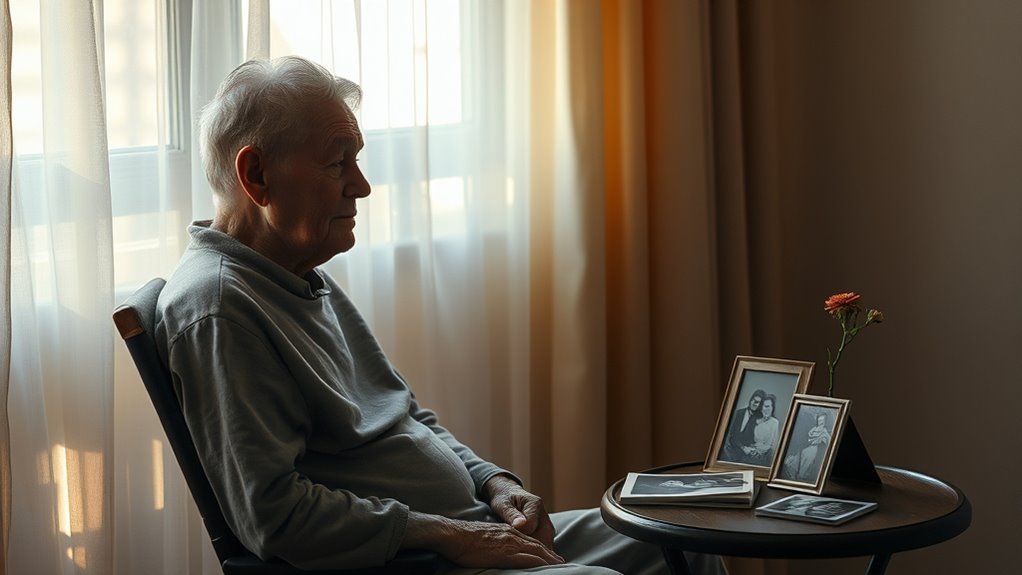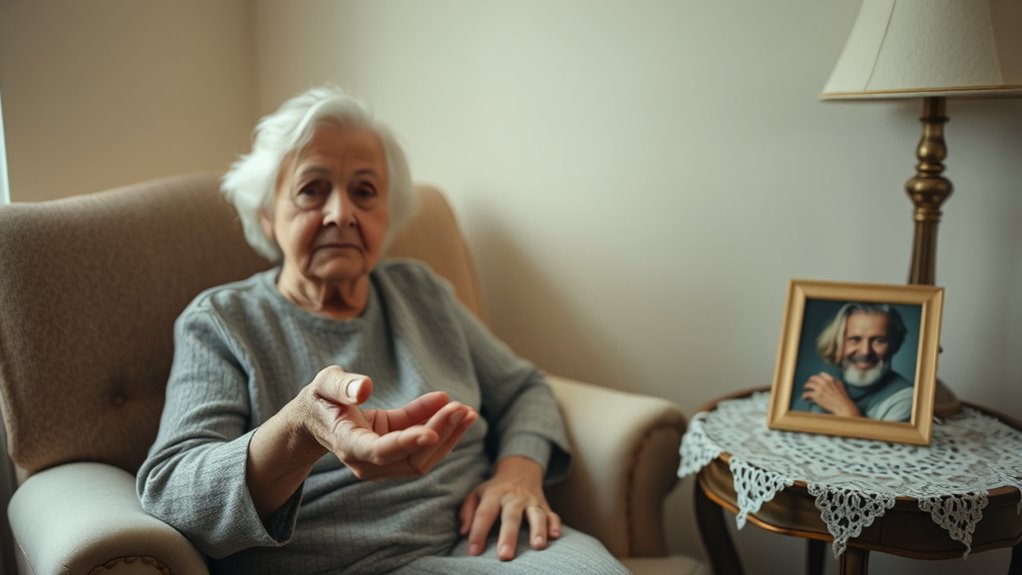Long-term caregiving often brings feelings of grief and loss, including anticipatory grief as your loved one’s condition worsens. You might feel sadness, frustration, or hope all at once. It’s important to recognize these emotions as normal and process them rather than suppress. Building emotional resilience and seeking support from friends, support groups, or counselors can help you cope. Understanding these feelings can ease your journey, and discovering more ways to manage them may bring you comfort.
Key Takeaways
- Anticipatory grief involves mourning a loved one’s potential loss before their passing, common in long-term caregiving.
- Recognizing and validating feelings of grief helps caregivers process emotions and reduces feelings of isolation.
- Building emotional resilience through support networks and self-care strategies is vital for sustainable caregiving.
- Expressing emotions and seeking support, such as counseling or support groups, aid in coping with grief and loss.
- Setting boundaries and engaging in personal activities support emotional well-being and resilience during caregiving challenges.

Caring for a loved one over the long term often involves more than just day-to-day tasks; it can also bring profound feelings of grief and loss. As you navigate this journey, you might find yourself grappling with a mixture of emotions—sadness, frustration, even moments of hope. It’s important to recognize that these feelings are normal, and developing emotional resilience can help you manage them more effectively. Emotional resilience isn’t about suppressing your emotions but rather about building the strength to face them and bounce back. You might find that leaning on caregiver support—whether from friends, family, or professional resources—can make a significant difference. Support networks provide a space to share your feelings, gain perspective, and receive practical advice, helping you feel less isolated in your experience.
Long-term caregiving can sometimes feel like an ongoing cycle of hope and grief. You may notice your loved one’s condition gradually worsening, and with each change, you might experience anticipatory grief—mourning the loss of the person they once were even before they pass away. This anticipatory grief can be emotionally exhausting, as it involves mourning what might be lost in the future while still caring for your loved one in the present. Recognizing these feelings as a natural part of the caregiving process allows you to process them rather than suppress them. It’s essential to give yourself permission to grieve and to seek caregiver support when needed, whether through counseling, support groups, or trusted friends.
To maintain your emotional resilience, it helps to set boundaries and prioritize your own well-being. Caregiving can be all-consuming, but neglecting your health and happiness only makes the emotional toll heavier. Take time for activities that refresh you—be it exercise, hobbies, or simply quiet moments alone. Remember, asking for help isn’t a sign of weakness but a crucial step in sustaining your mental health. Support groups tailored for caregivers often share strategies for coping with grief and loss, helping you feel less alone in your experience. Engaging with others who understand your journey offers comfort and validation, reinforcing that your feelings are valid and shared by many. Incorporating practices like mindfulness and visualization can further support your emotional well-being by fostering a sense of inner peace and clarity mindfulness and visualization.
Ultimately, caring for a loved one long-term means facing a complex web of emotions. Building emotional resilience and seeking caregiver support aren’t just strategies for survival—they are essential tools that enable you to care compassionately while honoring your own emotional needs. You don’t have to face this journey alone; support and resilience will help you find strength in the midst of grief.
Frequently Asked Questions
How Can Caregivers Recognize Signs of Anticipatory Grief Early?
You can recognize signs of anticipatory grief early by staying emotionally aware of your feelings and noticing warning signs like mood swings, withdrawal, or anxiety. Pay attention to changes in your thoughts or physical health, such as fatigue or irritability. By regularly checking in with yourself and acknowledging these emotional signals, you’ll better understand your evolving grief process and seek support before it becomes overwhelming.
What Strategies Help Manage Long-Term Caregiver Emotional Exhaustion?
Imagine yourself as a sturdy oak, standing firm against strong winds. To manage long-term emotional exhaustion, focus on building emotional resilience through consistent self-care routines like exercise, rest, and mindfulness. Break tasks into manageable steps, seek support from friends or support groups, and set boundaries to protect your energy. These strategies help you stay grounded, renew your strength, and continue caring with compassion and clarity.
How Does Cultural Background Influence Grief Processing in Caregiving?
Your cultural background shapes how you process grief through specific cultural rituals and bereavement customs. These practices guide your emotional response, providing comfort and meaning during tough times. By engaging in familiar rituals, you find a sense of connection and support. Understanding and respecting these customs helps you navigate grief more effectively, honoring your heritage while fostering healing and resilience in your caregiving journey.
Are There Support Groups Specifically for Anticipatory Grief?
Yes, there are support groups specifically for anticipatory grief. You can find support group availability through local hospitals, community centers, or online platforms. Many organizations also offer grief counseling options tailored for caregivers facing anticipatory grief. These groups provide a safe space to share experiences, gain coping strategies, and connect with others going through similar situations, helping you navigate the emotional challenges of caregiving more effectively.
How Can Caregivers Prepare for the Eventual Loss of Loved Ones?
To prepare for the eventual loss of loved ones, focus on building emotional resilience and engaging in future planning. You can discuss your feelings openly, seek support from friends or professionals, and create a plan for your own emotional well-being. Additionally, consider practical aspects like legal and financial arrangements. By actively addressing these areas, you’ll strengthen your ability to cope and find peace in the inevitable process.
Conclusion
Charting grief and loss in long-term caregiving is like walking through a storm that never quite ends. You might feel overwhelmed, but remember, your resilience is stronger than you realize. Every moment of anticipatory grief prepares you for what’s ahead, shaping you into an unstoppable force of compassion. Keep going—you’re not just surviving; you’re transforming pain into profound strength. Your journey is extraordinary, and your capacity to love through it all is nothing short of miraculous.









